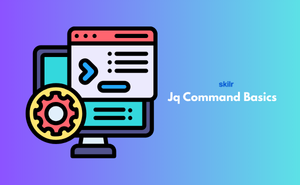👇 CELEBRATE CLOUD SECURITY DAY 👇
00
HOURS
00
MINUTES
00
SECONDS

Jq Command Basics certification focuses on teaching how to use the Jq tool to manage JSON data effectively. JSON is widely used for transferring and storing information in today’s digital world, and Jq acts as a smart filter that makes it easy to navigate and restructure this data.
By mastering Jq, candidates will be able to quickly query JSON files, pick out specific values, and reformat data as needed. This helps developers, analysts, and IT professionals handle data more efficiently without needing complex programming skills.
This exam is ideal for:
Domain 1 - Introduction to JSON
Domain 2 - Getting Started with Jq
Domain 3 - Reading and Parsing Data
Domain 4 - Filtering Data
Domain 5 - Transforming JSON
Domain 6 - Advanced Jq Operations
Industry-endorsed certificates to strengthen your career profile.
Start learning immediately with digital materials, no delays.
Practice until you’re fully confident, at no additional charge.
Study anytime, anywhere, on laptop, tablet, or smartphone.
Courses and practice exams developed by qualified professionals.
Support available round the clock whenever you need help.
Easy-to-follow content with practice exams and assessments.
Join a global community of professionals advancing their skills.
Yes, it can be installed on Linux, macOS, and Windows.
Yes, Jq is efficient and works well with large datasets.
JSON is the standard format for exchanging data in web applications, APIs, and cloud services.
Developers, analysts, and IT professionals who work with JSON data regularly.
Yes, Jq is often integrated into shell scripts for automation.
IT, cloud services, DevOps, data analytics, and software development.
It boosts efficiency in data handling and automation, making candidates more valuable in technical roles.
Yes, a basic understanding of JSON structure is necessary.
Yes, it’s free and open-source.
No, it complements them by simplifying JSON processing tasks.
Yes, it’s often used to process JSON output from cloud services like AWS and Azure.
Yes, it can parse and filter JSON responses from API calls.
Jq is designed specifically for JSON, while grep is for plain text.
Jq is used to process, filter, and transform JSON data from the command line.
No, only basic command line and JSON knowledge are needed.